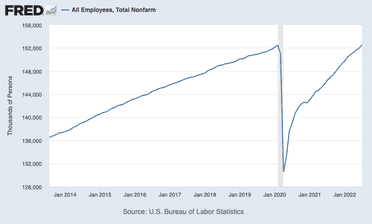What If Your Salary Is Too High For Today's Job Market? Navigating A Challenging Situation

Table of Contents
Understanding the Current Job Market Landscape
Before launching into a job search, it's crucial to understand the current market realities. Ignoring the economic climate and salary trends can lead to unrealistic expectations and prolonged frustration.
Analyzing Salary Data and Trends
Leveraging reliable resources is key to gaining a realistic perspective. Utilize tools like Glassdoor, Salary.com, Payscale, and LinkedIn Salary to benchmark your salary against current market rates for similar roles in your geographic location.
- Research average salaries: Compare your compensation to the average salaries for similar roles in your city, region, and even nationwide. Consider the size of the company (small business vs. large corporation) as this often influences pay.
- Factor in experience, skills, and education: Remember that your salary isn't solely determined by your title. Years of experience, specialized skills, advanced degrees, and certifications all influence your earning potential. Adjust your expectations based on the specific requirements of the jobs you're targeting.
- Identify salary compression or deflation: Some industries experience salary compression, where the difference in pay between different experience levels decreases. Others might see deflation, where salaries actually decline. Understanding these trends in your industry is vital for setting realistic salary expectations.
Identifying Realistic Salary Expectations
Accepting that some compromise might be necessary is a critical step. Your current salary may not be immediately attainable in a new role, especially if you're changing industries or geographic locations.
- Determine your minimum acceptable salary: Carefully consider your lifestyle expenses and determine the minimum salary required to maintain a comfortable standard of living. This will provide a crucial lower bound for your salary negotiations.
- Assess the value of benefits and other non-monetary compensation: Beyond base salary, consider the value of health insurance, retirement plans, paid time off, professional development opportunities, and other perks offered by potential employers. These can significantly offset a lower base salary.
- Explore negotiating other aspects of the compensation package: Instead of solely focusing on base salary, consider negotiating aspects like signing bonuses, stock options, performance-based incentives, or flexible work arrangements.
Strategies for a Successful Job Search
With a realistic understanding of the job market, you can implement effective strategies to improve your chances of securing a new role.
Targeting Appropriate Job Roles
Focus your job search on roles that are a good fit for your skills and experience, even if the advertised salary is lower than your current income. Avoid applying for roles that are significantly beneath your capabilities, as this can signal a lack of ambition or commitment.
- Consider roles with growth potential: Look for opportunities that offer clear career progression and the potential for future salary increases.
- Research companies with strong compensation packages: Target companies known for offering competitive salaries and benefits, even if the initial salary is lower than expected.
- Highlight transferable skills and experience: Focus on skills and experience that are relevant to a broader range of roles, even if they're not directly related to your previous positions.
Crafting a Compelling Resume and Cover Letter
Your resume and cover letter are your first impression, so make them count. Strategically highlight your relevant skills while downplaying your current (high) salary history.
- Quantify your achievements: Instead of simply listing your responsibilities, showcase quantifiable achievements and results to demonstrate your value.
- Use targeted keywords: Incorporate keywords relevant to specific job descriptions to improve your chances of getting noticed by Applicant Tracking Systems (ATS).
- Omit salary information: Avoid mentioning your current or desired salary in your initial application materials to avoid immediate rejection.
Mastering the Interview Process
The interview stage is where you can showcase your value and address salary expectations strategically. Be prepared to discuss your compensation expectations tactfully and confidently.
- Practice concise communication: Develop concise and effective answers to common interview questions, emphasizing your skills and achievements.
- Negotiate strategically: Be prepared to negotiate salary later in the process, after you've demonstrated your value and secured a job offer.
- Emphasize your eagerness to learn and contribute: Highlight your enthusiasm for the role and your willingness to learn and contribute to the organization.
Alternative Career Paths and Strategies
If the job search proves challenging, consider alternative career paths and strategies to maintain your income while securing a new role.
Considering a Career Change
A career change might be the right move if you're struggling to find suitable roles in your current field. This can require upskilling or reskilling, but it can open up new opportunities with potentially different salary expectations.
- Research industries with growth potential: Identify industries with strong job growth and reasonable salary expectations that align with your skills and interests.
- Consider upskilling or reskilling: Invest in additional training or education to acquire new skills that are in demand in your target industry.
- Network strategically: Connect with professionals in your target industries to learn about potential opportunities and gain insights into salary expectations.
Freelancing or Consulting
Freelancing or consulting allows you to leverage your existing skills and experience to generate income while continuing your job search.
- Offer freelance services: Utilize your expertise to offer services on freelance platforms or directly to clients.
- Build a strong online presence: Create a professional website or online portfolio to showcase your skills and attract clients.
- Set competitive rates: Research market rates for similar services to set competitive and profitable rates.
Negotiating a Reduced Salary
In some cases, you might need to proactively discuss a reduced salary with potential employers. Frame this as a strategic move to join their company and emphasize your long-term value.
- Focus on long-term value: Highlight the contributions you will make to the organization and your potential for future growth.
- Maintain a professional demeanor: Approach salary negotiations with confidence and professionalism, emphasizing your understanding of the current market.
- Know your bottom line: Determine your minimum acceptable salary before entering negotiations to avoid accepting an offer that doesn't meet your financial needs.
Conclusion
Finding yourself with a salary that's too high for the current job market can be daunting, but it's not insurmountable. By understanding the current market dynamics, strategically tailoring your job search, and exploring alternative options, you can successfully navigate this challenging situation. Remember to meticulously research salary data using resources like Glassdoor and Salary.com, focus on showcasing your transferable skills and quantifiable achievements in your resume and cover letter, and be prepared to negotiate effectively. Don't let a high salary define your career trajectory – proactively manage your job search and you'll find a fulfilling role that aligns with your skills and experience. Take control of your career journey and find the right fit, even with a high starting salary.

Featured Posts
-
 All The Moto News You Need Gncc Mx Sx Flat Track And Enduro
May 17, 2025
All The Moto News You Need Gncc Mx Sx Flat Track And Enduro
May 17, 2025 -
 The Enduring Impact Of Trumps 30 Tariffs On China A Forecast To Late 2025
May 17, 2025
The Enduring Impact Of Trumps 30 Tariffs On China A Forecast To Late 2025
May 17, 2025 -
 President Trumps Middle East Journey May 15 2025 A Retrospective
May 17, 2025
President Trumps Middle East Journey May 15 2025 A Retrospective
May 17, 2025 -
 Knicks Redemption Thibodeaus Transformation And The Overcoming Of A Key Weakness
May 17, 2025
Knicks Redemption Thibodeaus Transformation And The Overcoming Of A Key Weakness
May 17, 2025 -
 Your Guide To Moto News Gncc Mx Sx Flat Track And Enduro
May 17, 2025
Your Guide To Moto News Gncc Mx Sx Flat Track And Enduro
May 17, 2025
Latest Posts
-
 Knicks Pistons Game Officials Confirm Missed Call In Final Seconds
May 17, 2025
Knicks Pistons Game Officials Confirm Missed Call In Final Seconds
May 17, 2025 -
 Controversial Foul Call Missed By Nba Refs In Knicks Pistons Game
May 17, 2025
Controversial Foul Call Missed By Nba Refs In Knicks Pistons Game
May 17, 2025 -
 Knicks Win Over Pistons Nba Referees Admit To Crucial Missed Foul Call
May 17, 2025
Knicks Win Over Pistons Nba Referees Admit To Crucial Missed Foul Call
May 17, 2025 -
 Aews Josh Alexander Exclusive Interview On Don Callis And Future Plans 97 1 Double Q
May 17, 2025
Aews Josh Alexander Exclusive Interview On Don Callis And Future Plans 97 1 Double Q
May 17, 2025 -
 Nba Officials Acknowledge Missed Foul Call In Knicks Victory Against Pistons
May 17, 2025
Nba Officials Acknowledge Missed Foul Call In Knicks Victory Against Pistons
May 17, 2025
